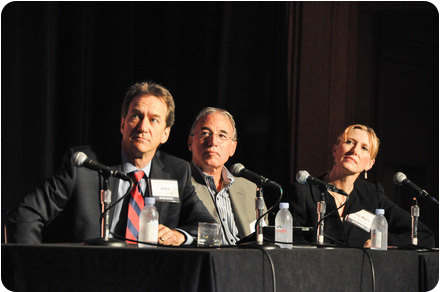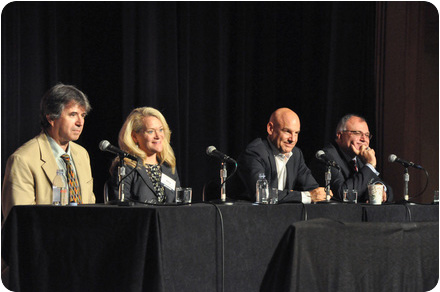
It was great seeing you at Cleveland HeartLab’s 5th Annual Symposium, “Where Inflammation Meets Lipids®: Broad Based Strategies for Risk Reduction”, hundreds of the best prevention-focused clinicians in the US convened in Cleveland to hear from world-class speakers on their approaches to disease prevention and patient management covering topics including:
- The benefits of a plant-based diet
- New strategies to detect early kidney disease and heart failure
- Innovative strategies such as group visits and technologies such as Google glass
- New topics on women’s health including HRT
- Measuring telomeres as an indicator of chronic disease risk
- Identifying the appropriate time to seek interventions such as bariatric surgery
- Psychosocial factors and their impact on cardiovascular disease
- Cardiovascular imaging and early detection of subclinical atherosclerosis
The program was highlighted by an interactive case study session and a candid discussion about where the new cholesterol guidelines leave the medical community as a whole.
Case Study Session
“Knowing more allows us to see the invisible hidden heart disease. We can use data and biomarkers to intervene prior to a cardiovascular event: Interventional Prevention” – Seth Baum, MD, FACC, FACPM, FAHA, FNLA
“Up to 70% of folks with cardiovascular disease have some degree of insulin resistance.” – A. Alan Reisinger III, MD, FACP

Case Study Panel: From left to right – John Lourie, MD, FACC; A. Alan Reisinger III, MD, FACP; and Anne-Marie Feyrer-Melk, MD
The ‘Great Debate’
“The new cholesterol guidelines haven’t changed my practice, since I try to be proactive with my patients.” –Michael Miller, MD, FACC, FAHA
“The AHA/ACC Cholesterol guidelines don’t dictate how we practice.” – Daniel Edmundowicz, MD, MS, FACC

The ‘Great Debate’ Panel: From left to right – Michael Miller, MD, FACC, FAHA; Amy L. Doneen, DNP, ARNP; Christie Ballantyne, MD,FACC, FACP; Daniel Edmundowicz MD, MS, FACC
Memorable Quotes
“A plant-based diet for type 2 diabetes improves weight, insulin sensitivity, and cholesterol levels”
– Neal Barnard, MD
“A multi-marker approach offers economic value to the system.”
– Marc S. Penn, MD, PhD, FACC
“Bariatric surgery can reduce mortality and cardiovascular events in people with diabetes”
– Stacy A. Brethauer, MD
“If seeing endothelial function & inflammatory markers improving, I’m not so worried about LDL.”
– Christie Ballantyne, MD, FACC, FACP
“An individual’s risk profile is key when contemplating hormone therapy”
– Holly Thacker, MD, FACP, CCD, NCMP
“Analysis of 43K patients shows that telomere length may independently predict risk for heart attack and stroke. We need to follow people long before they have the first heart attack and intervene at a much earlier stage.”
– Jerry Shay, PhD
“Fundamentally we are still in world where doctors are paid when they see the whites of a patient’s eyes.”
– Paul Grundy, MD, MPH
“We are now able to take prognostic markers and operationalize them to help supplement clinical judgment.”
– James Januzzi, MD
“The issue with the cholesterol guidelines is that they are still very LDL-centric, which isn’t the whole story.”
– Amy Doneen, DNP, ARNP
“Group medical visits can improve outcomes, care and improve productivity 200 – 600% with patient satisfaction scores above 90%. ”
– Shilpa Saxena, MD
“HER documentation is destroying the lives of doctors. You didn’t go to medical school to do data entry. Google Glass is the inevitable next wave of mobile. It allows you to spend that time with your patients. They like it when you pay attention to them!”
– Ian Shakil, CEO, AUGMEDIX
Missed us this year? That’s okay! – In keeping with our commitment to provide outstanding educational resources, Cleveland HeartLab will be launching a new CME portal this winter where you can watch many of these presentations as well as additional webinars given by world-renowned thought-leaders in cardiovascular and metabolic disease prevention.
*This Live activity, Where Inflammation Meets Lipids: Broad Based Strategies for Risk Reduction, with a beginning date of September 12, 2014, has been reviewed and is acceptable for up to 16.0 Prescribed credits by the American Academy of Family Physicians. Physicians should claim only the credit commensurate with the extent of their participation in the activity. AMA/AAFP Equivalency: AAFP Prescribed credit is accepted by the American Medical Association as equivalent to AMA PRA Category 1 Credit™ toward the AMA Physician’s Recognition Award. When applying for the AMA PRA, Prescribed credit earned must be reported as Prescribed, not as Category 1.
Program Supporters
Platinum Level
Gold Level
Silver Level












